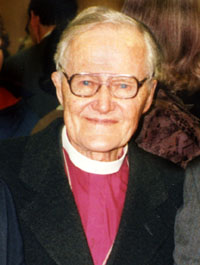On a cold February night in the Swiss Alps a gentle snowfall was visible through the window. My wife Marilyn and I were guests of Deborah and Udo  Middelmann. Ten of us sat around the coffee table drinking English tea from fine china cups. The candle flickered on the table, seemingly dancing in time with the classical music, accentuating our conversation. Then Udo, a German lawyer, spoke.
Middelmann. Ten of us sat around the coffee table drinking English tea from fine china cups. The candle flickered on the table, seemingly dancing in time with the classical music, accentuating our conversation. Then Udo, a German lawyer, spoke.
“Darrow, you know that Christianity is true even if you don’t believe it!”
“What?”
“Christianity is true even if you don’t believe it,” he repeated.
This statement contradicted everything I felt inside of me. I had been taught that Christianity was true precisely because I believed it.
For two nights I could not sleep. Finally, I realized what Udo was saying. Christianity is true even if no one in the world believes. Christianity is true because God exists. It is true because it matches reality. Christianity is true with a capital T.
This conversation helped me understand how secular my own thinking was. Secularism says there is no God; therefore, there is no truth; everyone has an opinion; therefore, whatever you believe is true. If you believe in Buddha, that is truth for you. If you believe there is no God, that is truth for you. If you believe in Islam, that is truth for you. If you believe in Christianity, that is truth for you. I realized that I had accepted Christianity as defined by my secular worldview. I had a circumcised heart but an uncircumcised mind.
Because Christianity is true, God is sovereign over all life
I also realized that if Christianity is absolutely true, then God wants to speak into every area of life. I had been burdened for people who were poor and needy. I realized now that this desire to help them wasn’t enough. God also wanted me to have the mind of Christ in relation to my calling, my vocation. He wanted me to think biblically. Biblical thinking means knowing that truth is universal; it applies to all cultures, it is binding on all cultures.
 Lesslie Newbigin, the great missionary statesman, had it right when he said, “A serious commitment to evangelism, to the telling of the story which the Church is sent to tell . . . is to affirm the gospel not only as an invitation to a private and personal decision but as public truth which ought to be acknowledged as true for the whole of the life of society.”[i]
Lesslie Newbigin, the great missionary statesman, had it right when he said, “A serious commitment to evangelism, to the telling of the story which the Church is sent to tell . . . is to affirm the gospel not only as an invitation to a private and personal decision but as public truth which ought to be acknowledged as true for the whole of the life of society.”[i]
Because truth is grounded not in our feelings or experiences but in God, it is enduring, absolute, propositional (reasonable and rational), and knowable, at least in part. Truth is objective. Truth stands whether anyone believes it or not. You’ll know someone is approaching this perspective when you hear questions such as “Is it reasonable?” and “Does it match reality?”
All truth is found in God
Reality, of course, integrates the physical and the spiritual. God exists outside creation, but nonetheless nature is real. Truth, therefore, is found in God and in creation. It is outside of us, independent of our limited perceptions, which include our five senses plus our reason. Although no culture has lived it out perfectly, the biblical worldview, as comprehensive truth, provides wisdom for every area of life. Because of this, science and technology, a moral philosophy for economics, civil society, and a comprehensive philosophy for education are all possible, waiting to be discovered by us.
Unfortunately, subjective approaches have gained the upper hand. Instead of asking, “Is it reasonable?” and “Does it match reality?” the subjective perspective asks, “How does it feel?” and “Does it work for me?” Instead of a rational foundation for human flourishing, we are left with the quicksand of emotions, feelings, and pure pragmatism. Truth is “discovered” individually, not acknowledged universally. Everything is a matter of opinion. Conveniently, this personalized  approach to truth excludes any need for consistency between the physical and the spiritual.
approach to truth excludes any need for consistency between the physical and the spiritual.
Only biblical theism gives proper respect to both the physical and the spiritual. Only it offers a unified field of knowledge. With it, all the “pieces” fit together in a coherent pattern to serve God’s unfolding kingdom. That is why our forebears recognized theology as the “queen of the sciences.” Theology is foundational to all other fields of study. Everything gets its meaning as it relates to its Creator. Henry van Til noted, “Culture is religion externalized.”[ii] This truth was well known before the current generation forgot it.
Culture derives from a people’s creed
Author and educator George Grant writes:
According to Augustine, culture is not a reflection of a people’s race, ethnicity, politics, language, or heritage. Rather, it is an outworking of a people’s creed. In other words, culture is the temporal manifestation of a people’s faith. . . .
The reason he spent so much of his life and ministry critiquing the pagan philosophies of the world, and exposing the aberrant theologies of the church, was that Augustine understood only too well that those things matter not only in the realm of eternity, determining the spiritual destiny of masses of humanity, but in the realm of the here and now—determining the temporal destiny of whole civilizations.[iii]
Building on Augustine’s work, the Reformers knew that all of life is to be lived coram Deo, in the presence of God. Secularists, however, compartmentalize life and privatize truth. But because, in their view, God doesn’t hold all things together, their world splinters into a billion pieces. Like a ball sent hurtling outward by centrifugal force, everything flies away from the center.
Animists have a different problem. They stuff all of life into a nonrational box and make truth unknowable. Our existence is pulled centripetally into a collapsing star, imploding our existence into a black hole of ignorance.
Only the biblical worldview captures Truth as God defines it.
Christianity is true whether you believe it or not!
- Darrow Miller
This DM&F Classic blog post is excerpted from the book Discipling Nations. For the entire text go here.
[i] Lesslie Newbigin, Truth to Tell (Grand Rapids: Eerdmans, 1991), 2.
[ii] Henry van Til, The Calvinistic Concept of Culture (Phillipsburg, NJ: Presbyterian and Reformed, 1974), 200.
[iii] George Grant, The Micah Mandate (Chicago: Moody Press, 1995), 218–19.






